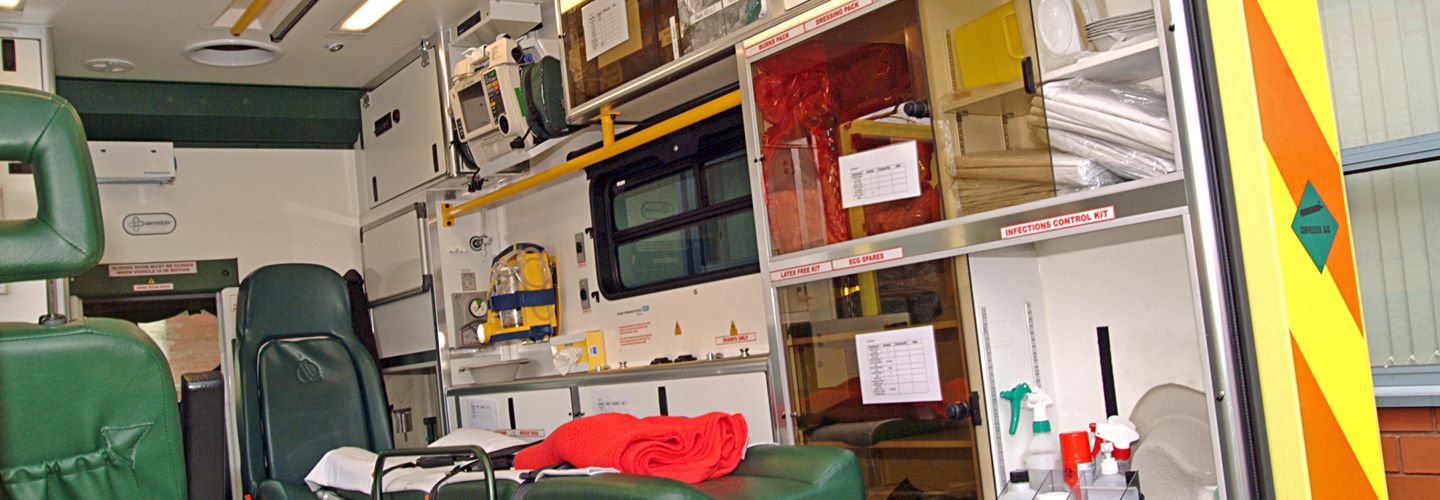Paramedic Clinical Research Unit (ParaCRU)
The Paramedic Clinical Research Unit, launched on 31 October 2018 at the University of Hertfordshire and is headed by Professor Julia Williams.
ParaCRU aims to build research capacity and capability among Paramedics to empower the profession to influence changes in service delivery, patient care and management as well as patients’ clinical outcomes in the years ahead.
Collaborative and multidisciplinary research is essential to move healthcare research forward and we need to capitalise on the growing opportunities to develop robust, inter-professional research to ensure that clinical practice is evidence based.
Please contact Professor Julia Williams to enquire about ParaCRU.
Our people
- Professor Guillaume Alinier
- Su Boardman MCPARA, AFHEA, MSc: Principal Lecturer in Paramedic Science, has an MSc in Advanced Musculoskeletal Research and Practice from the University of East Anglia
- Specialist areas of interest: Musculoskeletal research
- Will Broughton MCPARA AFHEA MSc: Senior Lecturer in Paramedic Science
- Specialist areas of interest: Paediatric emergency medicine. He is working with NHS England and the RCPCH on the development of a national paediatric early warning score, to sit alongside NEWS2.
- Dr Vince Clarke: Senior Lecturer in Paramedic Science
- Specialist areas of interest: Paramedic education, regulation, practice-based learning and research
- Sean Cloak
- Emma Partington
- Grace Reed
- Simon Travis
- Professor Julia Williams
- Phil Withers
Paramedic Science Unit
Research is an integral part of contemporary paramedic practice. At the University of Hertfordshire we have a commitment to research activity by contributing to the evidence base which underpins paramedic practice and education and providing our students with an environment that encourages them to engage with research and how it is translated into practice.
Find out more about the work of the unit
Research Areas / projects
- Systematic review of advanced airway management in paediatric out-of-hospital cardiac arrest, due August 2019, Will Broughton
- Evaluation of POPS in South Central Ambulance Service – Protocol being developed, Will Broughton
- NHSE / RCPCH Development of National Paediatric Early Warning Score, Will Broughton
Pre-Hospital Emergency Medicine (PHEM) Feedback
All work is a collaboration with Dr Matthew Snowsill and the PHEM Feedback Team. For further information, email Grace Reed.
The PHEM Feedback project provides a service for prehospital clinicians to request a patient-specific feedback report written by in-hospital doctors at one district general hospital (DGH). Clinicians are able to make requests for feedback if the care episode includes any of the following descriptors: critically unwell, diagnostic uncertainty and/or emotionally significant. The comprehensive reports are discussed in a debrief between the clinician and a senior ambulance clinician in order to guide learning and reflection.
PHEM Feedback Collaboration with East of England Ambulance Service NHS Trust (EEAST) and UH 2018-2019
Debriefer’s course to be designed for University of Hertfordshire (UH), in light of East of England Ambulance Service supporting PHEM Feedback as the sole feedback model for the service. The service is expanding to multiple hospitals and multiple sites in the EEAST. A Debriefers course due to run Summer 2019 will train Debriefers in how best to deliver reports and manage psychological impact.
PHEM Feedback Service Evaluation 2018
A pilot system ran from 23.4.2018 to 22.10.2018 to evaluate the service from the Clinician’s perspective. This was supported by the Health Research Authority (HRA) and Secretary of State for Health and Social Care, allowing information within the reports to be provided without patient consent. Primary purpose: to establish feasibility of creating a hospital to prehospital, debrief-led, case-based feedback system based upon confidential clinical patient information without patient consent which is acceptable to patients and observes relevant Information Governance legislation.
Secondary outcomes: satisfaction of participating Clinicians, likelihood to change practice, similarity of prehospital and hospital diagnoses, impact on mental wellbeing and satisfaction with the debrief. The satisfaction survey completed by 25 of the 28 service users (89.9%) demonstrates the importance of this service to the development and education of prehospital Clinicians. 72% (n=18) of the Clinicians felt that the report and debrief positively or very positively affected their mental wellbeing. 96% (n=24) were satisfied or very satisfied with the information returned. 100% (n=25) were satisfied or very satisfied with their debrief. Of 11 responding Clinicians who cited that they were ‘neither likely, nor unlikely’, ‘unlikely’, or ‘very unlikely’ to change their practice, 91% were satisfied or very satisfied with the returned information. 88% self-assessed their diagnosis as similar, very similar or identical to the corresponding hospital diagnosis.
The results from the service evaluation have been submitted as an abstract for the College of Paramedics conference May 2019.
PHEM Feedback National Conference 2019
PHEM Feedback Showcase 13th February 2019 at UH
Demonstrated the importance of feedback for prehospital staff in terms of staff wellbeing, education, reflection and ultimately patient safety. 150 guests attended the event to learn from experts about metacognition, moral injury and purpose of practice.
